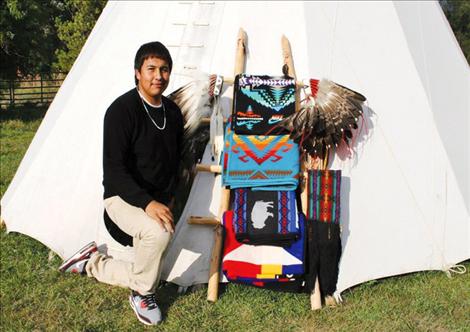Arlee youth honored as ‘Champion of Change’
Hey savvy news reader! Thanks for choosing local.
You are now reading
1 of 3 free articles.
ARLEE — If it’s a Sunday afternoon, chances are Vance Home Gun and Yayoot Skwkwimit, the Strong Young People, will be studying Salish language and Salish culture.
Vance, 19, is the youngest fluent Salish speaker on the Flathead Reservation. He was honored for learning the language, his fluency and his work with Yayoot Skwkwimit when he was chosen one of five Native American students as a Champion of Change by the Aspen Institute’s Center for Native American Youth. Formerly called the Native American Youth Challenge, the program shines its light on positive stories in Indian Country to promote hope among Native American youth and engage successful youth in leadership opportunities.
Other Champion of Change students honored were: Dahkotah Brown, Wilton Miwok tribe; Cierra Fields, Cherokee Nation of Oklahoma; Joaquin Gallegos, Jicarilla Apache and Pueblo of Santa Ana; and Sarah Schilling, Little Traverse Bay Bands of Odawa.
Vance, accompanied by his mother Debra, traveled to Washington, D.C., to be honored alongside fellow Champions of Change March 5-8.
Highlights of his trip, Vance said, were hanging out with the other four students and the Aspen Institute director and her staff and witnessing President Obama sign the Violence Against Women Act “that will really help Native women.”
Debra enjoyed seeing the rooms where treaties were signed with Native Americans and the room where Eloise Cobell fought the United States government.
Vance and his four comrades each received a medal and met many Native American leaders from around the United States.
Encouraged by his friend Pearl Yellowman Caye, Vance applied for Champions for Change. He wrote six essays, filled out applications and answered questions.
Vance has always been interested in Salish language and started on his quest to speak fluently when at age 10, his aunt enrolled him in a language camp.
“My Aunt Sophie Quequesah was the head language teacher and she got me interested,” Vance said. “I’d heard it my whole life, and I kind of had an understanding of (Salish) when people were having a normal chit chat. I could say a lot of single words but not really speak it in full conversation style.”
Besides his Aunt Sophie, He also learned from his mom’s mom as well as Dorothy Felsman and Sophie Haynes, “my main squeezes,” he said, chuckling.
These ladies were elders and yet, as a teenager, Vance hung out with them to learn Salish and more about the culture.
His grandmother, according to Debra, can’t get over Vance’s Salish fluency and vocabulary.
“She says his words are pronounced perfectly, and he brings back old words to her,” Debra said, explaining that her mother married and lived in Browning for 40 years so she didn’t speak much Salish there, just on visits back home.
“I don’t think our family realized how big an honor (Champions of Change) is for Vance,” she said.
Although her mother and grandmother are fluent Salish speakers, Debra said her generation and Vance’s father’s generation got skipped as far as Salish goes and didn’t speak as much.
“Even a lot of our fluent speakers don’t get to speak every day,” Vance said.
When he hears a new or different word, the name of a certain animal or plant, from a another fluent speaker, Vance brings that word to his grandmother, his aunt and his uncle.
He said he finds it easier to speak with elders who are fluent in Salish rather than speakers who are just learning.
He’s able to speak Salish at work with three other fluent speakers, since he works at the Salish Culture Committee.
Vance hears and speaks lots of Salish at wakes and funerals, he said, since many elders attend and the prayers and songs are in Salish.
Although he sounds much older, Vance is a senior at Arlee High School and has “a million things he wants to do in his life. If college is in that mix, Vance said he’d major in linguistics.
“As long as I’m helping the people, then I’m satisfied,” he added.
One of five board members of the Salish Institute, Vance said that group’s vision is to promote health, family and culture through the Salish people.
He’s also been on the team working on the Salish language curriculum that took six years to complete.
“My dream and vision is of a lot of (Salish) learners, future and present day, and that one day Salish is the first language of our people again,” Vance said.
















